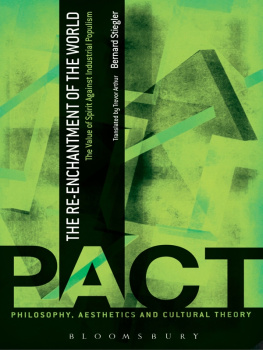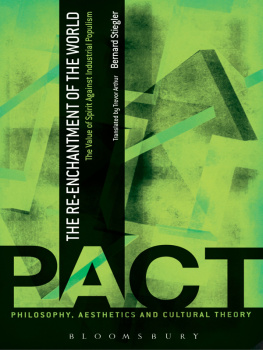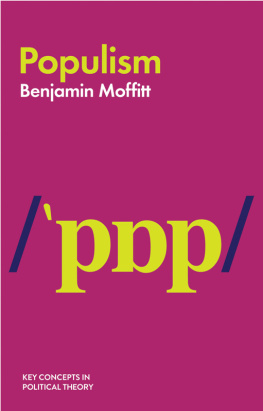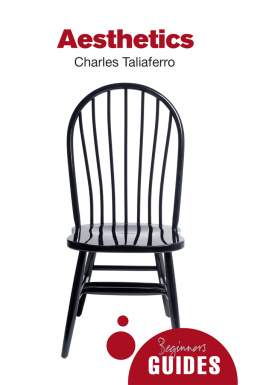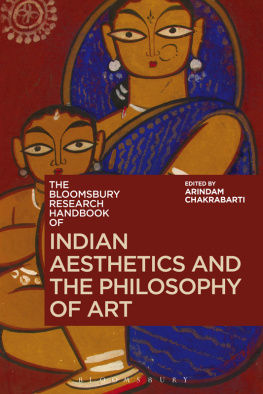Bernard Stiegler - Philosophy, aesthetics and cultural theory : the value of spirit against industrial populism
Here you can read online Bernard Stiegler - Philosophy, aesthetics and cultural theory : the value of spirit against industrial populism full text of the book (entire story) in english for free. Download pdf and epub, get meaning, cover and reviews about this ebook. year: 2014, publisher: Bloomsbury Academic, genre: Science. Description of the work, (preface) as well as reviews are available. Best literature library LitArk.com created for fans of good reading and offers a wide selection of genres:
Romance novel
Science fiction
Adventure
Detective
Science
History
Home and family
Prose
Art
Politics
Computer
Non-fiction
Religion
Business
Children
Humor
Choose a favorite category and find really read worthwhile books. Enjoy immersion in the world of imagination, feel the emotions of the characters or learn something new for yourself, make an fascinating discovery.
- Book:Philosophy, aesthetics and cultural theory : the value of spirit against industrial populism
- Author:
- Publisher:Bloomsbury Academic
- Genre:
- Year:2014
- Rating:4 / 5
- Favourites:Add to favourites
- Your mark:
- 80
- 1
- 2
- 3
- 4
- 5
Philosophy, aesthetics and cultural theory : the value of spirit against industrial populism: summary, description and annotation
We offer to read an annotation, description, summary or preface (depends on what the author of the book "Philosophy, aesthetics and cultural theory : the value of spirit against industrial populism" wrote himself). If you haven't found the necessary information about the book — write in the comments, we will try to find it.
Bernard Stiegler: author's other books
Who wrote Philosophy, aesthetics and cultural theory : the value of spirit against industrial populism? Find out the surname, the name of the author of the book and a list of all author's works by series.
Philosophy, aesthetics and cultural theory : the value of spirit against industrial populism — read online for free the complete book (whole text) full work
Below is the text of the book, divided by pages. System saving the place of the last page read, allows you to conveniently read the book "Philosophy, aesthetics and cultural theory : the value of spirit against industrial populism" online for free, without having to search again every time where you left off. Put a bookmark, and you can go to the page where you finished reading at any time.
Font size:
Interval:
Bookmark:
The Re-Enchantment of the World
Philosophy, Aesthetics and Cultural Theory
Series Editor: Hugh J. Silverman, Stony Brook University, USA
The Philosophy, Aesthetics and Cultural Theory series examines the encounter between contemporary Continental philosophy and aesthetic and cultural theory. Each book in the series explores an exciting new direction in philosophical aesthetics or cultural theory, identifying the most important and pressing issues in Continental philosophy today.
20th Century Aesthetics, Mario Perniola
Derrida, Literature and War, Sean Gaston
Derrida, Myth and the Impossibility of Philosophy, Anais N. Spitzer
Foucaults Philosophy of Art, Joseph J. Tanke
The Literary Agamben, William Watkin
Merleau-Ponty and the Paradoxes of Expression, Donald A. Landes
Philosophy and the Book, Daniel Selcer
The Re-Enchantment of the World
The Value of Spirit against Industrial Populism
Bernard Stiegler
Translated by Trevor Arthur
Philosophy, Aesthetics and Cultural Theory

Contents
Trevor Arthur
Renchanter le monde : le valeur esprit contra le populisme industriel does not present the translator with a high degree of difficulty when it comes to word choice, the language being largely philosophical or technical, and equivalent Latin cognates very often suggesting themselves. Where the prose waxes more poetic and the language more nuanced, Ive taken the liberty of rendering it in the most accurate and pleasing English constructions that I could muster. To maintain the style of the text proved somewhat more challenging, as the French facilitates a profusion of complex and intricately related clauses, often separated by hyphenations or nested parenthetically, that may become more awkward in the English. Nevertheless, Ive attempted to the greatest extent possible to maintain the original compositional style of the text, resorting to breaking up a sentence into two, or altering punctuation, only where absolutely necessary.
One issue worth noting concerns the decision as to whether or not to translate savoir-faire and savoir-vivre, both of which Ive chosen to leave in the French. Of course, savoir-faire has been incorporated into the English lexicon, regularly being used to express the capacity for seasoned practical knowledge, as well as the wisdom and deftness to employ it effectively in the face of fluctuating circumstances and their contingenciesthe kind that may call for genuine reflection and fluid variability of thought. Yet in a basic sense, savoir-faire refers generally to the craftsmans knowledge, or to any skilled capacity for production or purveyance of an essential service, that is, the knowledge historically accompanying the possession of a techne. Accordingly, when Stiegler and co. argue that the worker within the technological apparatus of production has been stripped of his savoir-faire, that is, proletarianized, we ought to hear both the general and the specific sense of the term. For not only has the worker been nearly completely subjugated to the service of machines, utterly divorced from a meaningful relation to the products of his labor, but society, too, has become saturated with service-industries that cater to mostif not allvital and non-vital aspects of contemporary personal and social life. Thus, the worker, be it in the mechanical or service industries, must not only serve but be served in his role as consumer of the products and services of the industrial technological system, having been gradually and systematically deprived of his creative savior-faire.
Subsequent to the loss of savoir-faire, the problem of savoir-vivre comes to the fore. Since it is precisely in his roles as both proletarianized wage-slave and consumer that the human being has been relieved of, and hence has relinquished, his savoir-vivre. As a result, he becomes proletarianized all over again. Traditionally, in the French, savoir-vivre denotes an exceptional fluency in the language of social graces, as well as aptitude and concern, or care, for oneself and for sociality itself, embodying a refined sense of politesse (understanding the term in the context of its etymological descent from the Greek concept of the polis, and hearing in it the sense of an elixir, if you will, which facilitates the production of circuits of social cohesion and makes possible relations of joyfulness and harmony in the social sphere, which Steigler, following Simondon, treats in terms of processes of individuation and transindividuation: respectively, creative valuation of the self and others vis--vis the world). In the society of consumption, on the other hand, the desire that serves to animate and engender sociality has been reduced to the pursuance of the fulfillment of drives, which, at its lowest point, nullifies processes of sublimation in the perpetual conflation of wants and needs, too commonly resulting in acts of barbarity and stupidity that are wrought of an addictive and toxic environment. Thus, when contemplating precisely what is meant by the loss of savoir-vivre, we ought to comprehend not only an accumulating loss of our abilities to care for ourselves and others, but also a disruption and canalization of indispensible circuits of individuation and transindividuation, which constitute our social sphere and provide the conditions for the possibility of the transmission of higher, moral, more human sentiments.
Such are the fundamental problems posed for man and society by what Stiegler calls industrial populism, the antidote to which, it is argued, is to be found in the value of spirit. The latter is the texts central notion, which the French presents as valeur esprit, omitting the gerund and treating esprit within the richest scope of its connotations. Hence, it is important finally to note the semantic insufficiency of the English spirit to encompass the composite meaning of the French esprit. Naturally both words find their provenance in the Latin spirituswhich originally denotes breath and breathingand so they equally possess the common philosophical sense of spirit qua immaterial or incorporeal substance, as such affiliated with the intellectual, religious, and moral faculties of man. However, in the fullness of its concept, esprit expresses a synthesis of the psychic and social, as well as intellectual and historical life of man, being tied up in the vicissitudes of processes of individuation in which one becomes who he is, and in processes of transindividuation whereby we become who we are. Hence esprit pertains, too, to the epochal nature of becoming in which memory and intelligence conjoin in the moment of reflection faced with the world, lighting the way forward from out of the depths of its inwardness. It is precisely this capacity of esprit to express vivacious reflection, searching rumination, and the passion of sublimation that renders it so valuableas such it constitutes perhaps the essential value of human being.
That is, if the world is to sing again, to emerge from its prolonged state of malaise, then a call back to and re-enchantment of spirit as esprit is required, and so too a return to the valuation of desire over drives, of association over discord, and to the practice of reflective knowledge that is something more and qualitatively different than a sober awareness of how far weve fallenthat is, if we wish to create the way forward.
Brooklyn, NY
Next pageFont size:
Interval:
Bookmark:
Similar books «Philosophy, aesthetics and cultural theory : the value of spirit against industrial populism»
Look at similar books to Philosophy, aesthetics and cultural theory : the value of spirit against industrial populism. We have selected literature similar in name and meaning in the hope of providing readers with more options to find new, interesting, not yet read works.
Discussion, reviews of the book Philosophy, aesthetics and cultural theory : the value of spirit against industrial populism and just readers' own opinions. Leave your comments, write what you think about the work, its meaning or the main characters. Specify what exactly you liked and what you didn't like, and why you think so.

